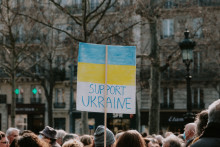UT's fundraising campaign aims to raise money for Ukrainian, Russian and Belarusian students in order for them to continue their studies at UT and to prevent them from being financially ruined by the war. ‘The money will be used primarily to help students of the UT with housing, renting and living expenses’, explains Josine Meerburg from the Twente University Fund. It is relatively uncomplicated to benefit from donations as a financially threatened student. ‘Students affected by the invasion of Ukraine can contact their study advisor to receive financial support through the fund.’
The goal of the campaign is to raise 100,000 euros. Currently, the fund has already raised more than 30,000 euros, which is why Meerburg feels that ‘people have been very generous, and that is really heart-warming to see.’ But the amount of money raised does not seem to be the only important aspect of the fundraising campaign. Meerburg emphasises that, ‘every euro counts, it doesn't matter if it's only five, ten or more, because the most important thing is that people get involved and show that they care.’ For Meerburg, it is important that not only Ukrainian, but also Russian and Belarusian students receive support from the fund. ‘It doesn't matter if it is a student from Russia, Ukraine or Belarus, they are all young people working for their future and we should help them.’
rental costs
UT spokesperson Bertyl Lankhaar says that the university is trying to make agreements with housing corporations De Veste and SJHT and other landlords, so that students do not have to leave their accommodation when they are (temporarily) unable to pay their rent.
Future education
The financial concerns of students affected by the Russian invasion are complex and severe, especially for Ukrainian students. ‘We students are totally dependent on our parents, especially because we are non-EU students, which means that this war is cornering us in terms of our future education’, says Viktoriia Konashchuk, an Ukrainian UT student. Konashchuk warns that ‘at first, the invasion will probably affect normal life, as we still have to pay rent and other living expenses.’ This is followed by the fact that the tuition fees for the next academic year must be paid by the families of the students.
The evident reason why it is difficult for Russian, Ukrainian and Belarusian families to support their relatives studying at UT is the falling economies of these countries, but for Ukrainian students it is even more difficult to send money from Ukraine to the Netherlands. A major challenge for Ukrainian students is that the Ukrainian currency, the hryvnia, can no longer be exchanged for euros. Konashchuk mentions that ‘the Ukrainian government has stopped the exchange of the hryvnia into euros in order to maintain the balance of the Ukrainian currency’.
In other words, even if a Ukrainian family could afford to pay tuition fees or living expenses in Ukrainian currency, they would not be able to exchange this money from hryvnia into euros. This means that Ukrainian students cannot receive financial support from their relatives living in Ukraine. Konashchuk explains that many Ukrainian students will have difficulties paying the upcoming tuition fees. Tuition fees are high, and since Ukrainian students cannot send Euros to the Netherlands, ‘many Ukrainian families will not be able to finance the upcoming tuition fees’, which is one reason why Konashchuk stresses that ‘this war definitely threatens our future education at UT’.







